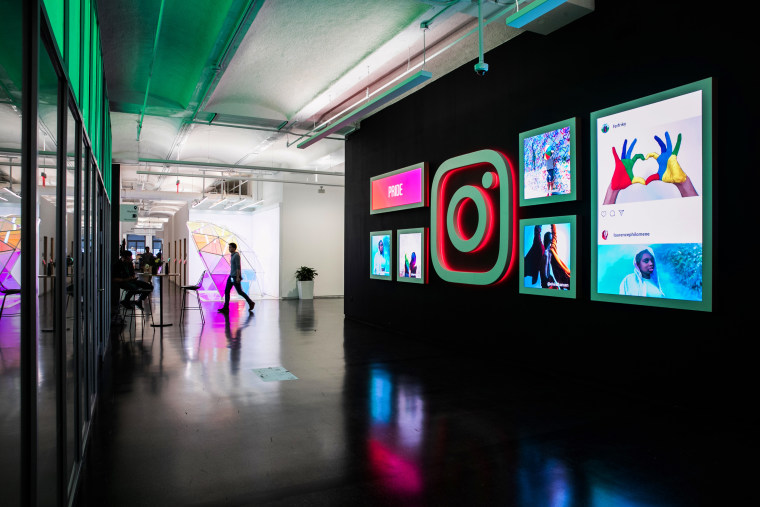Five of the world’s leading social media platforms are “effectively unsafe for LGBTQ users,” according to a new report from GLAAD, an LGBTQ media advocacy group.
In its inaugural Social Media Safety Index, released Monday, GLAAD evaluated the “LGBTQ user safety experience” of Facebook, Instagram, TikTok, Twitter and YouTube. Initially, the organization intended to grade each platform, but it changed course after it realized it would be giving all five failing grades, GLAAD President and CEO Sarah Kate Ellis said.
"What we realized was it wasn't the right starting point,” Ellis said in an interview with Axios. “The right starting point was to give them the information to act and give them a roadmap to be successful. This is about less watchdogging, more partnering with these platforms to get it right.”
The 50-page report’s key conclusions — in addition to finding the “entire sector” unsafe — were identifying the “prevalence and intensity of hate speech and harassment” as the “most significant problem in urgent need of improvement” across social media platforms and labeling the “problem of anti-LGBTQ hate speech and misinformation” on the platforms as a “public health and safety issue.”
According to an Anti-Defamation League survey referred to in the index, 64 percent of LGBTQ respondents reported experiencing online hate and harassment, compared to 46 percent of Muslims, 36 percent of Jews and about a third of Black, Latino and Asian American respondents.
One of the report’s criticisms of Facebook highlights “harmful” anti-LGBTQ advertisements and its inability to detect and bar them. GLAAD did, however, applaud the company for creating campaigns, product features and original content spotlighting the LGBTQ community.
In an emailed statement, Alex Schultz, Facebook’s vice president of analytics and chief marketing officer, said the company is committed to making the platform and its workplace “safe and inclusive places for the LGBTQ+ community.” He said Facebook has invested in artificial intelligence to remove hate speech, produced online safety guides and developed message request blocking tools on Instagram.
GLAAD encouraged Twitter to employ more human moderators to better interpret the legitimate use of LGBTQ terminology and to differentiate legitimate accounts from those of trolls and bad actors. The report said the company has, however, improved user safety by blocking hashtags known for spreading hate and by removing repeated offenders. GLAAD also applauded Twitter for prohibiting misgendering and deadnaming of transgender people.
A spokesperson said Twitter welcomes the report and the “opportunity to better understand the experiences and needs of the LGBTQ+ communities on our service.”
The report called out YouTube for the prevalence of content that GLAAD labeled as “anti-LGBTQ hate speech” on the platform. It also claimed that YouTube frequently removes, filters or demonetizes appropriate LGBTQ content for allegedly violating the platform’s community guidelines.
In response, a YouTube spokesperson thanked GLAAD for its “thoughtful feedback” and said, “Over the last few years, we’ve made significant progress in our ability to quickly remove hateful and harassing content against the LGBTQ+ community that violates our policies, prominently surface content in search results and recommendations from authoritative sources and limit the spread of extreme content by our recommendations.”
GLAAD criticized TikTok over allegations that it has “shadow banned” and censored some legitimate LGBTQ hashtags. The report said, however, that TikTok was quick to implement measures that reduced anti-LGBTQ hate speech and misinformation.
In response, a TikTok spokesperson said, “We share GLAAD's dedication to the safety of the LGBTQ+ community and will continue working with GLAAD and other LGBTQ+ organizations to help inform and strengthen our work.”
The report includes a nine-point “responsibility checklist” for social media platforms. The recommendations, intended to help them become safer for LGBTQ users, include “greater protection of LGBTQ users in community guidelines”; “improved content moderation”; “LGBTQ hiring, inclusion and leadership”; and “promotion of civil discourse.”
"The safety of LGBTQ people on social media platforms is an urgent public safety issue,” Ellis said in the report. “If we approach this issue using a lens of public health and public safety, it is clear that companies have an inherent responsibility to make their products not merely safer but actually truly safe — for LGBTQ users, and for everyone.”
GLAAD said it will include grades for each social media platform in subsequent annual reports.
